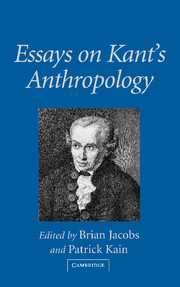Book contents
- Frontmatter
- Contents
- Contributors
- Essays on Kant's Anthropology
- 1 Introduction
- 2 Historical Notes and Interpretive Questions about Kant's Lectures on Anthropology
- 3 Kant and the Problem of Human Nature
- 4 The Second Part of Morals
- 5 The Guiding Idea of Kant's Anthropology and the Vocation of the Human Being
- 6 Kantian Character and the Problem of a Science of Humanity
- 7 Beauty, Freedom, and Morality: Kant's Lectures on Anthropology and the Development of His Aesthetic Theory
- 8 Kant's Apology for Sensibility
- 9 Kant's “True Economy of Human Nature”: Rousseau, Count Verri, and the Problem of Happiness
- 10 Prudential Reason in Kant's Anthropology
4 - The Second Part of Morals
Published online by Cambridge University Press: 19 July 2009
- Frontmatter
- Contents
- Contributors
- Essays on Kant's Anthropology
- 1 Introduction
- 2 Historical Notes and Interpretive Questions about Kant's Lectures on Anthropology
- 3 Kant and the Problem of Human Nature
- 4 The Second Part of Morals
- 5 The Guiding Idea of Kant's Anthropology and the Vocation of the Human Being
- 6 Kantian Character and the Problem of a Science of Humanity
- 7 Beauty, Freedom, and Morality: Kant's Lectures on Anthropology and the Development of His Aesthetic Theory
- 8 Kant's Apology for Sensibility
- 9 Kant's “True Economy of Human Nature”: Rousseau, Count Verri, and the Problem of Happiness
- 10 Prudential Reason in Kant's Anthropology
Summary
The Missing Link?
There are many important reasons for turning to Kant's lectures on anthropology. Anthropology was a new academic discipline in the late eighteenth century, and Kant played a pivotal role in its creation. Kant sometimes claims (and others have followed him on this point) that the fundamental questions of metaphysics, ethics, and religion “could all be reckoned to be anthropology,” on the ground that they all refer to the question “What is the human being?” (Jäsche Logik 9:25; cf. letter to C. F. Stäudlin of May 4, 1793, 11: 414; KrV B 833; Metaphysik-Pölitz 28: 534). Examining the various versions of the lectures could perhaps help one see what led Kant to occasionally describe anthropology as a kind of transcendental Urdisziplin. Similarly, Kant's anthropology inaugurates the continental tradition of philosophical anthropology, out of which numerous twentieth-century intellectual movements both grew (e.g., existentialism) and reacted against (e.g., Foucault's early “archaeological” work). A close look at Kant's lectures might help one better understand the roots of these and other related philosophical projects. Also, a comparative examination of the various versions of the lectures would enable one to test Benno Erdmann's “senility thesis” – namely, his claim (which others have extended to all of Kant's last publications) that Kant's 1798 Anthropology from a Pragmatic Point of View represents only “the laborious compilation of a seventy-four year old man as he stood on the threshold of decrepitude.”
- Type
- Chapter
- Information
- Essays on Kant's Anthropology , pp. 60 - 84Publisher: Cambridge University PressPrint publication year: 2003
- 39
- Cited by



